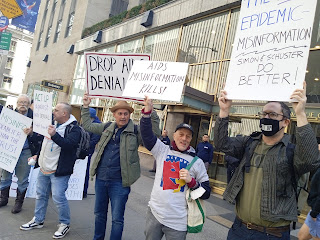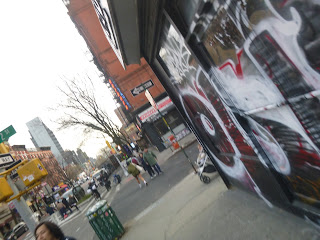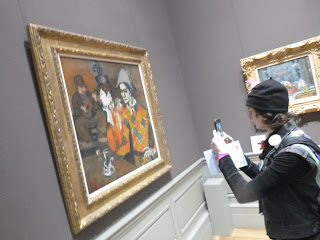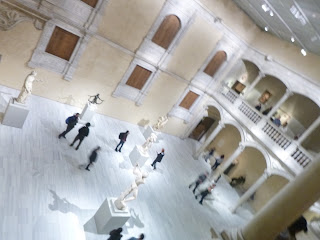Attorney Street (Handball Court with Autobiographical Poem by Piñero)
Stepping out of the A train at Utica Ave at midnight, a woman from Venezuela came up to me with a disjointed story. The person whose house she cleaned all day, in Bed Stuy, refused to pay her. Call the cops and let them work it out, he told her. I know you are an immigrant. Let them figure it out. Rattled, she needed to get home. I went to the bodega to get her money. The desperation is everywhere. That was my first conversation back. I did get a ‘welcome home’ from passport control. On it continued, the poverty, the moral constructions, the excesses, the misinformation, deflection and a city of friends trying to contend with it all.
The principal reason for my trip was to catch up with the college kid, unpacking it all from Berlin and Brooklyn.
In between, a few meetings and conversations, a demo, ACT UP against misinformation and AIDS denialism on Monday the 27th. In Germany, the anti vax, anti science logic propels opposition to immigrants and a rightward tilt in politics, center right politics. I see them march most every Monday night, often in the rain, outside my apartment, followed by police. It feels populist and undirected. But still finding a road through politics.
At the ACT UP 36th Anniversary Action, I looked for Tim, no longer there, wondering about Elizabeth Owens and Andrew Velez, Tim and Mel, who’d been at the actions on other years, each departed. I asked Brandon about them after he greeted me on my Quixotic journey. “They are not coming,” he said, shaking his head.
“Tell that to my friends who are dead,” read the sign I held. DONNA ACETO took this picture of me at the action: "Benjamin Heim Shepard conveys the real-life impact of HIV/AIDS on the community."
Chants filled the air:
“Stop making money on AIDS!”
“AIDS lies kill!”
“ACT UP, Fight back, fight AIDS.”
By way of background for the Monday action Outside Simon and Schuster Office- 230 6th Ave. and 49th St. Stop Spreading Deadly HIV/AIDS Misinformation. Book Publisher Ignores Calls To End Distribution of AIDS Denialist Book Scheduled For Release on Tuesday, March 28th.
“ Shame on Simon, Shame on Schuster,” screamed AIDS and LGBTQ+ advocates, rallying outside of book publisher on Monday, March 27th after they failed to respond to advocates’ plea to stop distribution of a book promoting AIDS denialism and HIV/AID misinformation.
On March 20th, ACT UP (AIDS Coalition To Unleash Power)/NY delivered a letter to Simon & Schuster, addressed to President and CEO Jonathan Karp, demanding that the company immediately end plans for distribution of the book The Real AIDS Epidemic: How Tragic HIV Mistakes Threatens Us All by Rebecca Culshaw. Activists demanded that the company reassess future releases to ensure they don’t harm public health and that Simon & Schuster form a public health advisory group to assure community members that this will not happen again.
“This book follows the blueprint of decades of AIDS denialism that has spread HIV misinformation and stigma while undermining efforts toward HIV education and ensuring that people with HIV lead long and healthy lives,” said Brandon Cuicchi of ACT UP.
The letter was signed by over 100 organizations and individual public health advocates, but Simon & Schuster has yet to respond to the advocates' demands publicly or privately. As the letter was being circulated, the link hosting the book was deactivated on the Simon & Schuster website.
“While this is a good sign, there is no indication as to what this actually means regarding their plans for distribution. We need confirmation that they are going to pull the book, and that they are going to take steps to make sure that this doesn’t happen again, like cutting ties with Skyhorse," said Leah Hollander of ACT UP.
In an email correspondence with Salon, a representative from Simon & Schuster denied responsibility for the content of the books they distribute for their client. Yet as Skyhorse’s sole US market distributor, Simon & Schuster is responsible.
“It’s easy to say that fringe opinions can’t attract an audience after we’ve made such immense progress and have taken revolutionary steps to preventing, treating, and curing HIV/AIDS” said Jason Rosenberg of ACT UP “But who would have thought AIDS deniers would be given platforms as large as these?”
On Monday, just days after the anniversary of the first ACT UP action in 1987, AIDS activists, fighting this same battle for 36 years, held a press conference and rally outside of Simon & Schuster’s Office to denounce AIDS denialism and HIV misinformation in all its form.
“Words kill,” said Anthony of Housing Works. “The rejection of science is nothing new. This publisher has an obligation. Readers will hold them accountable. The state of New York has a road map to end HIV/AIDS. We need to tell them the real experience. I’ve lost family and friends. For them to accept this is wrong. We have to fight this.”
“My name is Jason,” said Jason Rosenberg. “I have been with ACT UP since 2015. “AIDS denialism still kills. We know from COVID that misinformation still kills. We demand Simon & Schuster ends the publication of this book. We denounce this company and want this to stop.”
Mark Hannay recalled the first AIDS demo against Burroughs Wellcome over their prices. “Last year, congress took the first steps to control drug pricing with the Inflation Reduction ACT. We have a lot to do to reign in drug costs. And stop AIDS denialism.” He paused for a second to ask that we recall those no longer with us, Andy and TIm, Elizabeth and Mel, lost the last few years. “They are why we still do this. ACT UP, fight back, fight AIDS.”
The AIDS demo was not the only cleavage point of the weekend. News reports all week hinted that the former president could be indicted in NYC.
I read about it in Berlin at the bright train station. On the move, between here and there, chatting with Greg about it once I arrived.
Ran into friends on the subway, in the park, at Cafe Regio, outside of Tompkins, chatting with famous Ray, who had been mugged after work the week prior, before giving away his beignets in Tompkins, stumbling into Bat and company by the Gaia tree, going to see friends.
At the library, JC and I talked about Miami. “Arthur MCDuffie was not an activist,” said JC, recalling the case that shook him. “He was an insurance salesman who was brutally killed by police under an overpass in downtown miami.” I was talking about Rodney King and my awakening. McDuffie was his. Riots followed the acquittal of the four police officers from Dade County charged in his murder. The streets of Miami filled with people, riots throughout May of 1980.
On we talked, dancing into the night.
Saturday, started the day at Union Square and a trip to the farmers market, before joining the kid at Veselka, Ukrainian blue and yellow everywhere, in solidarity. After brunch, we made our way to the Met, talking about the Milaf Cordoba, the great Mosque of Cordoba, the Sedes Sapientiae, the seat of wisdom Mary cult, and Abbott's photos of Djuna Barnes, author of Nightwood, a Parisian story of a love triangle. Every time I go with her, I learn more, as we talk music and art history, the East Village scene, Japanese art, contemplating Martin Wong’s Attorney Street Handball Court, words from Pinerro, taking in stories about Wombat’s graffiti all over the Lower East Side. When she heard Sasha’s band Choking Victim, she decided not to shower. And jumped on the road, from NYC to New Orleans, to San Francisco, back to New York, spray painting, surviving, tagging a new consciousness.
Stopping at the Modigliani, we are both struck by the story of Jeanne Habiturne and Modigliani. She posed for dozens of his portraits. When he passed from meningitis in 1920, she threw herself from a window, at the age of 21, perishing on the street below, along with her unborn child.
Love and oblivion, ascending, descending, crashing, the conversation extended, from Blood and Guts in High School by Kathy Acker and Nadja by Andre Breton, we’re both respectively reading.
“My wish is that you may be loved to the point of madness,” writes Breton.
“Life’s greatest gift is the freedom it leaves you to step out of it whenever you choose.”
The friends were everywhere, @savitrid.nyc and the city, Peter and Colin and Donald and the Judson crew and Earth Church. New Yorkers chalking memories of those who perished in the Triangle Fire, messages on the sidewalk, the climate clock in Union Square, remembering the women of Judson, a hug from @jennyselig, a greetings from Valerie, a morning coffee with Babs, a stroll and dumplings with the kid, on and on to see mom, as Spring welcomed us, flowers pop up from the ground, as the Earth awakens.
Al met me at Bijans for a pint and a snack, chatting away, the history of music and people ever evolving and shifting, After hours, through time.
Mom greeted us, Mom and Granddaughter forever matching, green and purple, still giggling.
Trees along the way, sidewalk graffiti, hello and goodbye to a favorite tree, moss on the ground about it, where the kids played before they grew up ... Ever greeting mom... Home to birds ever chirping... Welcoming the spring mist.
Demos into the afternoon, greeting Jack Shepard, from a rainy afternoon at the Chelsea Hotel, where he used to stay, the ghosts of New York of Spring, remaining in the leaves, in the raindrops on a drizzly afternoon.
Conversation after conversation, @jtofthebay
at the demo. Afterward, we walked to the baths, chatting away about Howard Zinn and poems and our movements. At some point, we talked about Intersectional Class Struggle by Michael Reagan: “This innovative study explores the relevance of class as a theoretical category in our world today, arguing that leading traditions of class analysis have missed major elements of what class is and how it operates. It combines instersectional theory and materialism to show that culture, economics, ideology, and consciousness are all factors that go into making “class” meaningful….It investigates how the concepts of racial capitalism and black feminist thought, when applied to class studies and popular movements, allow us to walk and chew gum at the same time—to recognize that our movements can be diverse and particularistic as well as have elements of the universal experience shared by all workers. Ultimately, it argues that class is made up of all of us, it is of ourselves, in all our contradiction and complexity.”
One conversation after another, a burger here, a soup there, followed by a wonderful meeting with my PhD advisor @irwinepstein, exploring the histories of conflicts and possibilities of friendships, the subject of his great new book, unpacking the workings through, the rebel friendships, the ones that got away, and those that held. Irwin and I have known each other for over two decades, through my research on play, as well as the move to consider friendship and conflict. Friendship has changed and so have we. Yet, how do we make sense of it, of what happened and what might become of it? What is there to learn from the stories of friendships, of the history of philosophy that it reveals, of Svevo, James Joyce’s Italian tutor, who became the model of Leopold Bloom, and their abundant conversations. Svevo asked Joyce question after question about the Irish experience. Joyce, in turn, built a world around his old Italian tutor. Says Stanley Price: “A critic once asked Joyce did his Ulysses have to be Jewish? His reply was ‘Yes. Only a foreigner would do. The Jews were foreigners in Dublin at that time. There was no hostility towards them. But contempt, the contempt that people always show towards the unknown.’” Welcoming strangers as friends, this is the stuff of possibility. Friends remind us; they shake up the cobwebs, expanding what we can be. No friendship is the same. The question is: can we recognize what they bring? Can we see their subjectivities? Such are the questions Axel Honneth and the critical theorists asked, wondering about the possibilities of recognition here in Germany.
Irwin tells me about Susan Neiman’s article, “The Search for Reconciliation”, in the New York Review of Books. “The philosopher Jacob Taubes was torn between the desire to heal the split between Judaism and Christianity— particularly between Germans and Jews—and his doubts that it was possible." And offers me a copy of the article to explore. There are a lot of layers for you, he tells me, pointing to the story of a philosophy professor at The Freie Universitat, where I’m studying sociology all year. His work was part of a generation of German philosophers wondering what kind of philosophy is even possible after Auschwitz. While Richard Rorty turned to pragmatism, narratives and life stories, Frankfurt theorists concerned themselves with the scent of fascism still in the air, after the end of the second world world. Is redemption possible in Germany? Is it possible in Sarajevo or the US South? At least in Germany, the government acknowledges the past. I feel it here. The same cannot be said of much of the US, particularly Florida where the governor has criminalized such forms of inquiry in public school curriculum. Reckoning is never simple,not historically, not today.
“Most mis-reported story of the year: Israelis’ insistence on refusing to deal with Apartheid and its consequences, mis-represented as “protecting democracy.”” says Sarah Schulman.
Like few else, Irwin has encouraged my work, helping me point to the possibilities of a mixed method study of friendship and conflict, cities of friends and riots. “This shit will never end,” he says. There is no simple bow I can wrap around the stories of travel in a divided world. Instead just keep on looking at the demonstrations, counsels Irwin, some weeks anti vax, others against NATO and immigrants, a generation ago against the Wall and war, hot war, cold war, arguments and counter arguments, one demonstration after another, reactions and counter reactions.
I guess it's a matter of how we live with them, how we make meaning of the friends and the clashes. Mom was going to study Iranian art, actively planning to do so for over a decade after her trips to Iran in the 1960’s. And then the Iranian Revolution took place and she dodged the topic, unable to travel there anymore. She turned away from the topic, moving toward investigations in more friendly terrain on the “Conventual Use of St. Anselm’s Prayers and Meditations,” as well as a PhD on the Lambeth Bible. Throughout our trip to Berlin together, we explored these mutual interests, in both Islamic Art and illuminated manuscripts. For Mom, manuscripts contain a sort of magic power, transmitting knowledge through time. She told me stories about negotiating to see manuscripts in old libraries. I had to cajole the guards to show Will and I the frescos in Kosovo, telling them Mom would be disappointed if we missed them. And it worked. They lead us to the old church. She had to convince the gatekeepers of the Lambeth Bible she was at a reputable institution. And finally they relented, allowing her access. Ever secluded and guarded, manuscripts are still meaningful, even after all these years, says mom. She still cares about them. Our trip to the Jewish Museum was a highlight of her trip to Berlin, time travel back to pre recorded time, the transmission of knowledge in the making of the scroll.
Taking the train from Princeton New York, early in the morning, I look at the fog, the morning dew, at Patterson, the rusted buildings, the industrial waterfront, at the rusted out cars, the crumbling city in the distance, polluted water, someone getting rich off of us, the rest of us making due with the inequality, ever expanding, the woman from Venezuela I saw that first night in town, the salesman unable to sell enough to make rent, the queer kids, blamed for the violence, the obfuscation, smokescreens, the inequality rotting away at us all.
I catch the news headlines from the NY Post:“Nashville-school-shooter-audrey-hale-identified-as-transgender-and-had-detailed-manifesto-to-attack-christian-academy…” Sigh I think, looking at the construction, the crains, the bodies, fog in the distance, the kid blamed for the killing, the panics and distaractions, increased costs ever looming, unsustainable, desperation, agitation, guns everywhere, our train whirling across the landscape, past Seacaucus, Newark, to Penn Station, locomotion, ideas and bodies, ever moving, interacting, arriving, departing, leaving mable back in Princeton.
“The Living End is one of my favorite movies,” said the kid, over lunch at MUDSpot, a diner on 9th Street, in the East Village, down the street from where Allen used to live. On we chat about Village Works, priced out of their current home, and their move to St Marks Place.
And gradually, a full wonderful day opened, friends and strolls from the East Village to the West, back to Brooklyn and Barbes, and live music.on the way back to Berlin thinking of the buddies of NYC, the stories and struggles everyone is up against, the chaos and misinformation, the beauty and challenges, the fun and the high costs of it all...
On the way back, I find myself thinking of them all, of the people I know. I want to write a poem about them, my tribe who meets in the park and gossips, for Bear who writes poems about pee and disappearing vapors, returning from the Park, for Ray, who makes beignets for us all in the park, for Peter, who chit chats with everyone and sells Kale in the park, for Mom, who thinks about her manuscripts and her garden, for JC who puts on plays in the park, for Billy, who gives sermons about putting down the credit card, for Michael who ranted on soap boxes in the park, for Kevin, who used to give tours, before the alarm clocks of reality started to ring, for Colin, who takes breaks from writing in the park, for Brennan, who drinks cold beer with me in the park and conspires about Berlin, and Catherine who reads with us, for the college student who likes the stinky boys in the park, and Babs, who lives North of the Park, for James, who comes from San Francisco to New York, to learn stories about the squatters in the park, and Damien, who runs the bookstore and feels homesick for an old New York, he’s never known, and Irwin, who knew Harold in Mobilization for Youth, who worked near the park, and told me stories about Svevo and James, and Fran and his friends from the road.
Ready to write for a bit, to try to make sense of it all, the clash and the struggle for reconciliation, the amnesia and the violence.
It was great NYC, Au Revoir. Hasta pronto.
Within a few days of getting back, news of a Queens man indicted,
the former president charged.





















































































































































































No comments:
Post a Comment